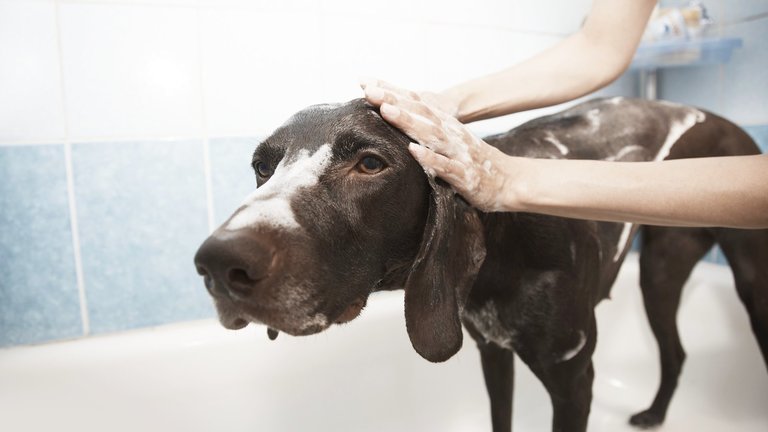Pet Vitamins and Supplements
Jump to:
Should I Give My Dog Supplements?
If your dog is healthy and fit (no skin conditions or joint problems for example) and is fed a commercial dog food that is labeled as “complete and balanced”, he will not need pet vitamins or supplements. In fact, feeding your dog a “complete and balanced” quality dog food is the best way to ensure your dog gets all the nutrients he needs.
However, your dog will need pet supplements if:
- You make homemade dog food,
- Your dog is old and stiff,
- Your dog has a health issue (particularly a skin condition or arthritis).
Choose a complete all-in-one pet supplement that includes vitamins, minerals, enzymes, Essential Fatty Acids and probiotics.
Some pet vitamins and supplements can interfere with medications, so if your dog is on medication, discuss supplements with your vet before giving them to your dog.

Can I give my dog human vitamins?
Not without veterinary guidance. Dogs and humans have different nutritional needs. Too much calcium, for example, can cause skeletal problems in large breed puppies. Too much vitamin A can cause joint immobility and pain. Human supplements will contain nutrients that are in the wrong dosage for dogs and can contain additives that are harmful to your dog such as the artificial sweetener xylitol.

Do joint supplements work for dogs?
Some do, some don’t and some have yet to be proven one way or the other. Choose joint supplements that have been thoroughly put to the test in double-blind, controlled multiple studies.
Some commercial dog treats contain joint supplements but in quantities that won’t do much good. If your dog has a joint problem, he will need therapeutic levels of joint supplements. For correct supplement dosages, talk to your vet.
Below, we list the joint supplements that have been proven to work.
What is the best hip and joint supplement for dogs?
Glucosamine hydrochloride
Note that this is different to Glucosamine sulfate, which has no evidence to show that it reaches the synovial tissue of joints in dogs. A joint supplement doesn’t help if it doesn’t get where it needs to be. Glucosamine hydrochloride, on the other hand has been proven to build cartilage in dogs. Osteoarthritic dogs treated with glucosamine hydrochloride showed significant improvement by day 70. Glucosamine hydrochloride is also cheap, easy to find, and can safely be given to pets with diabetes.
Chondroitin sulfate
This supplement inhibits cartilage-destroying enzymes, but it’s pricey. When given with glucosamine, chondroitin has a synergistic effect making both supplements more potent when paired.
Avocado soybean unsaponifiables (ASUs)
ASUs protect cartilage against damage and help the bone and cartilage in knee joints to heal. When combined with glucosamine and chondroitin, ASUs increase the effectiveness of each and reduces the amount of chondroitin required.
Omega-3 fatty acids
Omega-3s are known to support heart health and joints, improve kidneys and boost the immune system, but the dosage for each condition varies. The best source of omega-3s are from wild-caught cold water fish such as salmon.

What pet vitamins and supplements should I use to treat skin conditions?
Skin conditions affect one in three dogs at some point in their lives and pet nutrition plays a key role.
If your dog scratches and bites at his skin creating bare patches, or of the skin is flaking, red or irritated, your dog has a skin condition. This might be due to:
- Allergies: Food or environmental
- Insufficient fatty acids in the diet
- Parasites: Flea bites, mite infestations
- Infections
- Excess weight
Here are five ways to improve skin condition and build your dog’s natural skin barrier.
1. Essential Fatty Acid supplements
Fish oil, flax oil, hemp oil, evening primrose oil and borage oil contain large amounts of Essential Fatty Acids (EFAs) and other nutrients for healthy skin and coat. EFAs will calm your dog’s itchiness, resolve flakiness and nourish his coat.
2. Regular Parasite Control
Make sure your dog is protected against parasites. Parasite control has come a long way in recent years, making toxic rinses and weekly flea baths a thing of the past. A simple monthly chew will keep your dog free from fleas, ticks, mites and worms. Chat to your vet about the most suitable parasite control for your dog.
3. Monitor his diet
Most food allergies are in response to a protein source. If you suspect your dog might have a food allergy, work with your vet to devise a food trial based on novel proteins such as fish, venison, duck or rabbit.
Mite-infested grains are also a hidden cause of allergies. At unsafe levels mite-infested grains are deemed unfit for human consumption, but they can be used in pet food, so choose high-end pet foods that use ‘human quality’ ingredients. Oats, barley, millet and rice are the least likely grains to cause allergies. Some pet foods omit grains altogether and substitute them with starchy vegetables such as potatoes and yams.
Making your own dog food from our homemade dog food recipes gives you more control, but you will need to add a complete all-in-one supplement to each meal that includes vitamins, minerals, essential fatty acids, enzymes and probiotics. Choose one that is sourced from organic ingredients if you can find it.
4. Do not Over Shampoo
Do not over wash your dog as this will strip the natural oils from your dog’s coat and impair the skin’s natural defense barrier. Use a quality dog shampoo and rinse the coat thoroughly. Reserve dog washes for when soiled or smelly. Dogs with a healthy skin and coat do not require regular washing.

5. Manage your dog's weight
Overweight dogs are prone to hot smelly skin. Those in the obese range find it difficult to groom themselves and are physically unable to reach parts of their body. Skin folds and fat rolls cause reduced skin ventilation with secondary yeast and bacterial infection.
Improve your dog's longevity and quality of life through successful weight management. Found out more about WAGSTA veterinary-guided weight plans today.
